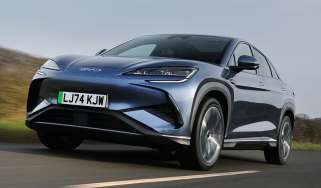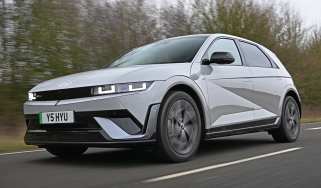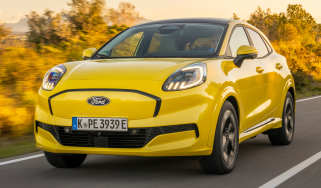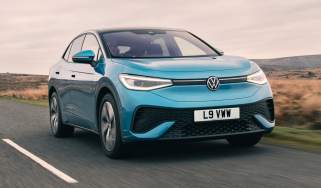Electric car battery size: how to pick the right EV battery
An electric car’s battery size has a big impact on range – here’s what you need to know
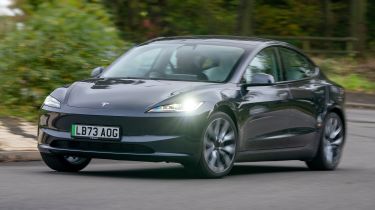
As electric cars grow in popularity, car buyers are quickly having to come to terms with new jargon, including battery size.
The battery is one of the most important components of any electric car. It plays a crucial role in determining the range of an EV, as well as its charging time, overall performance and initial purchase cost. Different models use different size batteries, but bigger isn’t always better, as we'll explain in this guide.
If you’re considering making the switch to electric, understanding battery size and its implications is key to finding the right car for your needs. We’ve also covered some other important EV topics, including how long electric car batteries last, range anxiety and electric car charging stations.
What does battery size mean?
The size of an electric car battery is essentially how much energy it can store. It’s typically measured in kilowatt hours (kWh), which is a unit of energy. For example, a 50 kWh battery can supply 50 kilowatts of power for one hour or five kilowatts for ten hours, depending on how the energy is used.
In the context of EVs, battery size is directly linked to the car’s range. A larger battery can hold more energy, enabling the car to travel further on a single charge. However, bigger batteries come with some disadvantages, as they’re often more expensive to produce and replace and they can be heavier than smaller batteries.
When we talk about battery size, we’re nearly always referring to the energy capacity of the battery, not its physical size. That said, the two are often linked – a 100kWh battery will nearly always be physically larger and heavier than a 50kWh battery.
Does battery size affect range?
It certainly does. Battery size is directly related to the range of an EV, with bigger batteries usually delivering a longer range. Think of an EV battery like the fuel tank in a petrol car – the bigger the tank, the further you can typically drive before refuelling.
Choosing an EV with a bigger battery is one of the key ways to avoid ‘range anxiety’, which is the fear of running out of power before reaching a charging station. But it’s important to note that range isn’t determined by battery size alone. Factors such as your driving style, ambient temperature, and even terrain can influence how far you can travel on a single charge.
The relationship between battery size and range becomes more complex when you consider the size, weight and aerodynamics of the car. Larger, heavier cars, such as SUVs, require more energy to move. As a result, they need bigger batteries to achieve the same range as a smaller, lighter car. That’s why many manufacturers fit their biggest electric SUVs with batteries upwards of 80 or even 100 kWh, giving them enough range to be competitive.
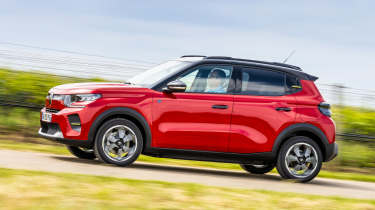
Today, an electric city car will typically use a battery of around 40 to 50kWh. For example, the Citroen e-C3 uses a small 44kWh battery and can travel up to around 200 miles on a charge – plenty for urban driving. At the other end of the spectrum, the Audi Q6 e-tron SUV is fitted with a 95kWh battery, allowing for nearly 400 miles of range.
Does battery size affect charging time?
Battery size does have an impact on charging time, but there are other factors at play, too. A bigger battery will take longer to charge than a smaller one when charged at the same speed. However, some batteries can be topped up at a faster rate than others.
The power of an electric car charger is usually measured in kilowatts (kW). Most home wall box chargers typically provide around 7kW of power, meaning a 50kWh battery could be completely recharged in around seven hours. However, a 100kWh battery could take around twice as long to recharge using the same charger. This is important to remember if you plan to charge your EV mostly at home.
But things get more complicated when you consider public rapid chargers. These deliver much more power than home wall box chargers – sometimes over 300kW. This can slash charging times to under 30 minutes, but not every battery is compatible with such speeds.
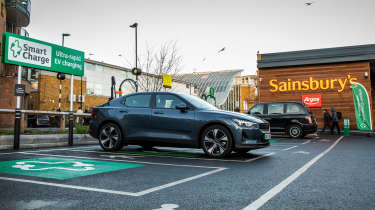
Generally, more affordable electric cars aren’t compatible with the fastest charging speeds. Using our earlier example, the Citroen e-C3 can be topped up with a charger of up to 100kW. A top up from 10 to 80% would take around 30 minutes. However, the Audi Q6 e-tron can be charged using a 270kW charger, meaning a 10 to 80% top up could take as little as 21 minutes, despite the battery being over twice the size of the Citroen’s.
We have a complete guide to electric car chargers if you’d like to find out more.
What size battery should I get?
Choosing the right battery size is a balancing act and it really comes down to your driving habits and budget. A larger battery might seem appealing with its longer range, but it’ll often come at a price premium. It’s worth considering whether the extra money will be worth it if you only occasionally take long trips.
If you mainly stick to commuting and urban driving, a car with a small battery will probably be sufficient. Many of today’s small electric cars can manage over 200 miles of range, which could be plenty for a week’s commuting. EVs with small batteries are usually quicker to charge at home, too, which could be crucial if this is where you plan to do most of your charging.
If you need an EV that can tackle long distances, then you’ll probably need a larger battery. With a longer range, you won’t have to stop as frequently to recharge. However, a bigger battery usually means a bigger price tag, so you’ll need to consider whether the extra cost will translate to more convenience.
You may also want to consider the environmental impact of larger batteries. Larger batteries typically require more resources to produce, so choosing a smaller battery, if it suits your needs, could be the more eco-friendly option.
Battery technology is advancing rapidly, which means the trade-offs between size, range, and cost are becoming less pronounced – a trend that’s expected to continue. Newer battery chemistries promise greater energy density, allowing smaller batteries to deliver more range. Solid state batteries, for example, are expected to revolutionise the market in the coming years, offering faster charging and improved longevity.
Frequently Asked Questions
Yes, different manufacturers use different size batteries in their electric cars. Sometimes, the same car will be offered with a choice of battery sizes, allowing customers to pay a bit extra for more range.
More car technology explained
Recommended
Most Popular

New Smart #5 Brabus is a 637bhp far cry from the brand’s city car past

Best car leasing deals 2025: this week’s top PCH offers
Tips & advice

Car dashboard warning lights: what does each symbol mean?

Electric car charging stations: public networks, charger types, apps and maps

